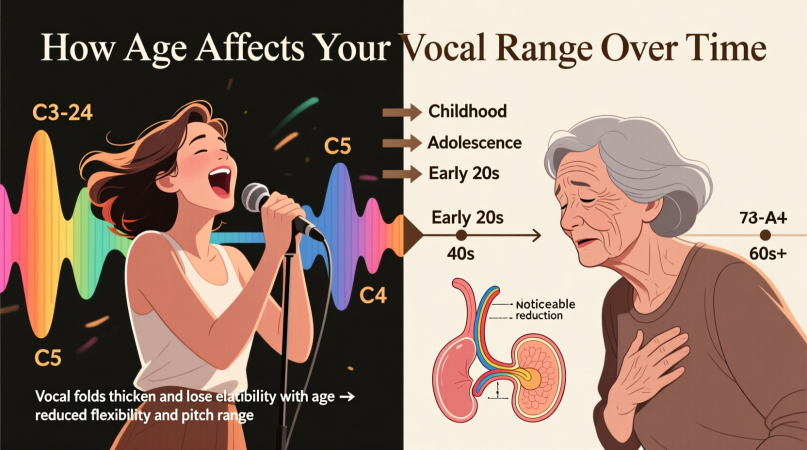
Your voice is a living instrument. Just like muscles and joints, it changes as you age. While some singers maintain an impressive range into their later years, most experience shifts in tone, stamina, and flexibility. Understanding how age affects vocal range helps you prepare, adapt, and continue singing with confidence.
What Happens to Your Voice as You Age
As the body matures, the vocal cords (vocal folds) undergo natural changes:
- Elasticity decreases → cords don’t stretch as easily.
- Muscle tone weakens → less closure and control.
- Mucosal thinning → dryer cords, more breathy tone.
- Cartilage stiffens → slower response in pitch adjustments.
These shifts don’t mean you’ll lose your ability to sing. Instead, they may change how you access your range and which parts of your register feel comfortable.
👉 Start by mapping where your voice sits today with the Vocal Range Test homepage. It’s the easiest way to see how your instrument is evolving over time.
Vocal Range by Life Stage
20s–30s: Peak Performance
- Strongest balance of chest, head, and mixed voice.
- Full flexibility across high and low ranges.
- Stamina supports longer practice and performance.
40s–60s: Subtle Adjustments
- High notes may require more support.
- Tone often warms and thickens.
- Recovery time increases after heavy singing.
60s+: Noticeable Shifts
- Top notes can fade, especially for sopranos and tenors.
- Men may lose some depth as testosterone drops.
- Women post-menopause often gain access to slightly lower notes.
- Overall range narrows slightly, but resonance may deepen.
👉 You can track your personal shifts with the Vocal Range Calculator to see which notes remain steady and which are changing.
Why These Changes Occur
- Aging larynx: Reduced flexibility in cartilage and muscles.
- Hormonal changes: Menopause in women lowers pitch; men may lose low notes after 60.
- Lung capacity: Gradual reduction means less sustained breath for long phrases.
- Technique habits: Singers who maintain healthy practice often retain range longer.
Can You Slow Vocal Aging?
Yes. You can’t stop time, but you can minimize vocal decline with consistent habits:
- ✅ Stay hydrated to keep cords supple.
- ✅ Warm up and cool down before and after singing.
- ✅ Practice light daily exercises to maintain flexibility.
- ✅ Protect your voice from strain, smoking, or shouting.
- ✅ Consider voice therapy if you notice persistent hoarseness.
Common Questions About Aging and Vocal Range
Do all singers lose range with age?
Not equally. Some lose only a few top notes, while others see both high and low ends shrink.
Is vocal aging reversible?
You can’t reverse biology, but proper training can restore lost coordination and extend usable range.
Do men and women age differently vocally?
Yes. Men often lose low notes; women often lose highs but gain lower range after menopause.
Can exercises keep my voice young?
Daily light exercises—lip trills, hums, scales—preserve flexibility and prevent stiffness.
